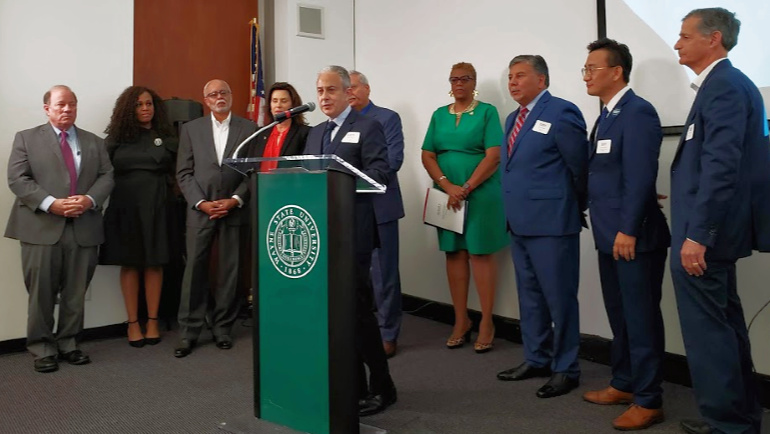
Once every decade, a very important piece of mail makes its way to mailboxes throughout the nation. Contained in the envelope is an invitation to complete a document — paperform or online — that will affect the nation and Michigan in a huge way, both financially and politically.
The upcoming 2020 Census results will translate into hundreds of billions of dollars. Annually, more than $675 billion in federal funding is distributed to states and communities; Michigan alone receives close to $30 billion.
The funding, based on the census taken every 10 years, supports numerous programs and services such as Medicaid, student loans, school lunches for children, foster care, housing and infrastructure improvements — including roads and bridges — to name a few.
Earlier this week, Governor Gretchen Whitmer joined Mayor Mike Duggan, Wayne County Executive Warren C. Evans and other luminaries to express the importance of participating in the 2020 census during the Minority Media Summit on Census 2020, held at the McGregor Memorial Conference Center at Wayne State University.
The summit, hosted by New Michigan Media and the Michigan Nonprofit Association, featured two panel discussions exploring what is at stake for Michigan and how to get the word out to communities about the importance of completing the census.
Hayg Oshagan, New Michigan Media director and Wayne State University professor of communications, pointed out to the more than 70 attendees representing various minority media outlets and organizations that the cost of not filling out the census form is two-fold. “One critical factor is funding, the other is political,” Oshagan said. “The census count is used for 10 years funding critical programs. Once it’s done, the final number will be used during the next 10 years.”
The political effect is reflected in the number of congressional representatives composing Michigan’s delegation in the U.S. House of Representatives. Oshagan noted that in 2010, Michigan lost a congressional seat. The U.S. House of Representatives has 435 members, divided from among the states based on the census count. If Michigan’s count is lower, that may affect the number of seated representatives in the state.
In 2010, the census completion rate in Detroit was only 64% — one of the largest declines in participation nationally. The drop cost the city tens of millions of dollars in federal funds.
Oshagan noted that the lack of participation in completing the census is a fear that personal information will be sent to law enforcement or government agencies. The census, however, is confidential by law and may only be used by the Census Bureau for data gathering.
Loraleigh Keashley, associate dean of curricular and student affairs in Wayne State’s College of Fine, Performing and Communication Arts, reflected on the important role of the census. “This knowledge about the census's central role in determining financial resources and access to political voice and influence for our communities is critical. What is also critical is the trepidation and fear of minority communities that the information they share will be used against them, which affects their willingness to participate. Everyone needs to be counted,” Keashly said.
Key dates for the 2020 census include:
- March 2020 — National mailing to all households
- April-July 2020 — Reminder letters/postcards sent to those not responding
- July 2020 — Response deadline
- Dec. 31, 2020 — Census Bureau delivers count to the president
- March 2011 — States receive official count
For further information and downloadable resources about the Census 2020, visit Be Counted Michigan 2020.
